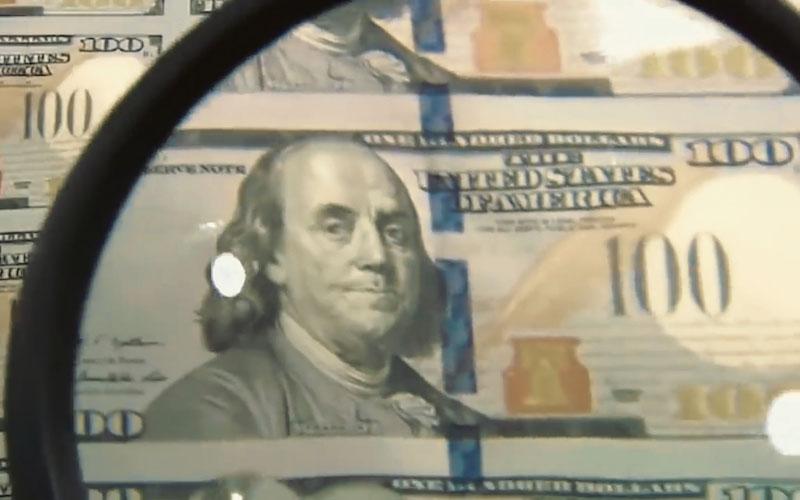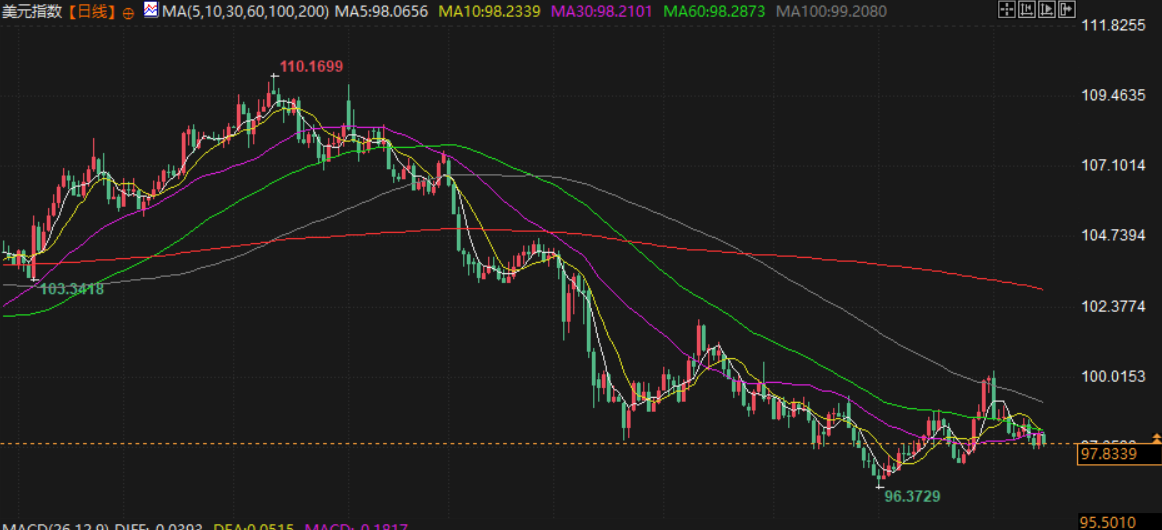The US dollar closed lower on a weekly basis, with the market focusing on the Fed's expected September rate cut and optimistic progress made at the Russia-US summit.
2025-08-16 08:21:24

The dollar jumped on Thursday after data showed U.S. producer prices rose more than expected in July, but gave up most of those gains on Friday, leaving the greenback down 0.4% for the week against a basket of currencies.
"The PPI data was shocking, but there's still little concrete evidence that tariffs will lead to a surge in inflation," said Kyle Chapman, currency market analyst at Ballinger & Co in London. "The dollar gave up its gains this morning as bets on a September rate cut remain firm and the focus now shifts back to Alaska," Chapman added. Money markets are pricing in a 93% chance of a 25 basis point rate cut by the Federal Reserve in September, according to CME FedWatch.
The baseline forecast for most economists polled by Reuters remains a September rate cut by the Federal Reserve, its first of the year, followed by possibly another by the end of the year amid growing concerns about the health of the world's largest economy.
Chicago Federal Reserve Bank President Goolsbee said on Friday that he was "uneasy" about rising services sector inflation in the latest report this week because he believes tariffs are having a "stagflation-like" impact on the economy.
The dollar found little support after data on Friday showed U.S. import prices rebounded in July, boosted by rising costs for consumer goods. Separately, U.S. retail sales rose solidly in July, boosted by strong demand for autos and promotions from Amazon and Walmart.
Markets are also awaiting clues from next week's Jackson Hole symposium on the Fed's next move. Signs of weakness in the U.S. labor market, coupled with any inflation from trade tariffs, could create a dilemma for the Fed's trajectory in rate cuts.
Investors also focused on the Trump-Putin summit on Friday. At a joint press conference with Russian President Vladimir Putin, US President Trump stated that the two sides had made significant progress, reaching agreement on many issues and leaving few remaining issues. However, there was one important issue on which no agreement was reached. Trump will later call Ukrainian President Volodymyr Zelensky, NATO leaders, and other individuals he deems appropriate to update them on the meeting. Trump expressed hope for good and productive meetings between the US and Russia in the future and expected to meet with Putin again soon. Putin suggested the next meeting might be in Moscow.
"While anything could happen in the meeting between Trump and Putin, I think expectations for progress toward a lasting ceasefire are low, which would tilt the risk toward a weaker dollar if the market is pleasantly surprised," Ballinger's Chapman said.
Most analysts expect the euro to benefit from any ceasefire agreement in Ukraine. The euro rose 0.5% against the dollar to $1.1702.
Barclays analysts wrote in a report that if the Russia-Ukraine summit yields substantial progress toward resolving the Russia-Ukraine conflict, the euro and Central and Eastern European currencies could rise. The analysts said that given the sensitivity of the euro, Hungarian forint, Polish złoty, and Czech koruna to oil supply shocks and the proximity of conflicts in Central and Eastern Europe, any positive news would benefit these currencies the most. In contrast, any progress toward a ceasefire could cause the Swiss franc to decline due to its safe-haven status. Furthermore, the Norwegian krone and Brazilian real, as oil-producing currencies, could also come under pressure.
George Vessey of Convera said in a report that continued capital inflows from the US dollar into the euro are limiting the pound's upside potential against the euro. "The options market is reflecting this dynamic," he said. Despite the euro's recent decline, risk reversals continue to favor euro strength against the pound in the longer term, he said. A sustained rise in the pound would require a shift in inflows into the eurozone or a more cautious stance from the Bank of England on rate cuts. However, markets have scaled back bets on rate cuts, particularly after this week's strong wage growth and better-than-expected economic growth data.
The British pound rose against a weakening dollar on Friday, extending its weekly gains following upbeat economic data and a hawkish Bank of England rate cut. The pound was last up 0.2% at $1.35520, bringing its weekly gain to 0.7%. The Bank of England cut its benchmark interest rate by 25 basis points to 4% last week, but the decision was passed by a narrow 5-4 majority. This suggests the central bank may be cautious about further rate cuts due to persistent inflation concerns, even amid worsening unemployment.
Ebury strategist Matthew Ryan said in a report that the prospect of the Bank of England maintaining a cautious stance on interest rate cuts should support the pound through the remainder of 2025. He said the UK economy proved surprisingly resilient in the second quarter. Data released Thursday showed stronger-than-expected growth of 0.3%. Ryan said this should ease pressure on the Bank of England to continue cutting interest rates, as markets are preparing for a pause in easing policy at its upcoming meetings in September and December.
The dollar fell 0.4% against the yen to 147.23 yen after unexpectedly strong Japanese economic growth data showed exports were holding up despite new U.S. tariffs.
The yen's strength was further boosted this week by comments from U.S. Treasury Secretary Jeffrey Besant that the Bank of Japan may be "lagging behind" in addressing inflation risks.
Japanese Finance Minister Katsunobu Kato said on Friday that monetary policy falls under the jurisdiction of the Bank of Japan. The Bank of Japan is expected to work closely with the government to adopt appropriate monetary policy to achieve price targets continuously and stably. It is necessary to pay close attention to the economic and price background behind the recent comments from the business community calling for the Bank of Japan to raise interest rates, but the specific monetary policy decisions depend on the Bank of Japan.
Yoshimasa Maruyama, an economist at SMBC Nikko Securities, said U.S. Treasury Secretary Jeff Bessant's comments that the Bank of Japan is lagging in its fight against inflation are unlikely to affect the Bank of Japan's stance. "This is different from the calls for a rate hike earlier this spring, which were driven by exchange rates," Maruyama said. "A key focus remains when the Bank of Japan will decide to raise rates again after assessing the impact of tariffs," he added. Bank of Japan Governor Kazuo Ueda has said he sees little risk of Japan lagging behind, but at the same time, he has maintained his stance of seeking further rate hikes.
Takeshi Minami, an economist at Norinchukin Research Institute, said Japan's GDP data released earlier on Friday appeared consistent with the economic forecasts in the Bank of Japan's latest outlook report. "The confirmation of sustained growth, coupled with the ability of companies to pass on higher costs, could support a rate hike before year-end," he said in a report. He added that while private consumption grew only modestly in the second quarter, a stronger recovery is possible if inflation begins to slow in the second half of the fiscal year.

- Risk Warning and Disclaimer
- The market involves risk, and trading may not be suitable for all investors. This article is for reference only and does not constitute personal investment advice, nor does it take into account certain users’ specific investment objectives, financial situation, or other needs. Any investment decisions made based on this information are at your own risk.





















